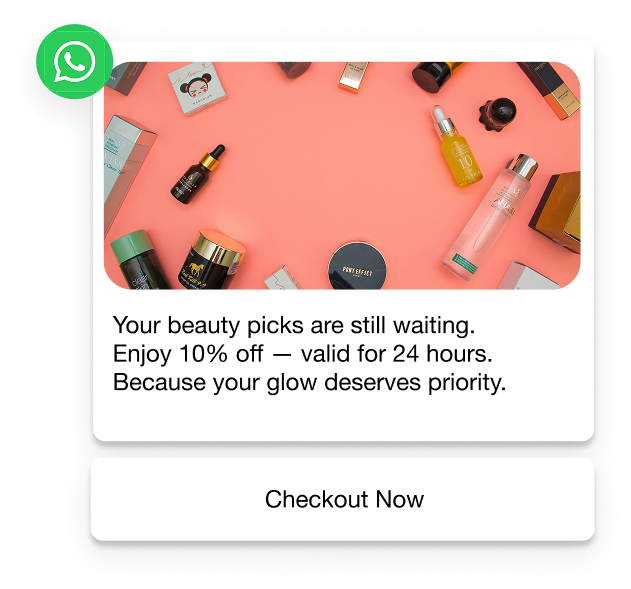Key Takeaways
- WhatsApp campaigns have the highest open rates and fastest replies—ditch the newsletter, use chat.
- Segment your audience, personalize every message, and automate follow-ups to drive real action, not just clicks.
- Use Flowcart to plan, send, and track everything, from new product launches to loyalty pushes—no manual work needed.
Your customers aren’t checking their inbox; they’re checking WhatsApp.
In 2025, conversations and conversions, both happen on WhatsApp. 175 million people interact with a business on WhatsApp every day. It's the channel to showcase products, to alert buyers about discounts, and even to resolve their queries.
But how do you market on WhatsApp? This step-by-step guide will show you how to launch powerful WhatsApp marketing campaigns that get sales moving fast.
Why WhatsApp Campaigns Work Better Than Traditional Channels
Before diving into the ABCs of running WhatsApp campaigns, it’s important to understand what makes WhatsApp such a powerful marketing tool. Three main factors set it apart from traditional channels: high engagement, conversational communication, and strong personalization.
High open rates
WhatsApp is the world’s most popular messaging app, connecting nearly 3 billion users every month. It also enjoys open rates as high as 98% within the first 3 minutes, far exceeding traditional channels like email, which average around 23%.
Conversational marketing
Unlike one-way communication methods such as email, conversational marketing on WhatsApp enables real-time, two-way conversations with customers. This approach feels more personal, builds trust, and motivates customers to take action.
Enhanced personalization
With WhatsApp, brands can go beyond generic messages by sending tailored content through smart segmentation and audience insights and responding directly to customer interactions. This personalized touch makes it easier to build meaningful relationships and drive higher engagement.
Also Read: WhatsApp vs Email Marketing in 2026: Which One Wins?
Step-by-Step Guide to Running a WhatsApp Marketing Campaign
A successful WhatsApp campaign is one that inspires action. Here’s a complete, step-by-step guide to help you plan, execute, and optimize your campaigns effectively:
1. Define Campaign Objectives
Every successful campaign starts with a clear goal. Do you want to boost sales, drive engagement, or offer customer support? Defining your objective helps shape your messaging, audience selection, and success metrics.
Why it matters:
Without clear objectives, your WhatsApp messages risk feeling scattered and directionless. Knowing your goal ensures your efforts stay focused, whether that’s converting leads, nurturing relationships, or resolving queries.
How to do it:
List your top business priorities and map each campaign to one. For example, create a “product launch” campaign to drive sales or a “thank-you” campaign to improve retention. Keep objectives measurable, such as “Increase repeat purchases by 15% this month.”
2. Build an Opt-In Audience List
WhatsApp’s policies require businesses to message only users who have opted in. This ensures compliance and also builds a list of genuinely interested customers.
Why it matters:
An opt-in list prevents spam complaints, maintains trust, and increases the chances of engagement because your audience wants to hear from you.
How to do it:
Use your website, social media, or checkout page to collect permissions. Offer value in exchange, for instance, “Subscribe on WhatsApp for exclusive offers” or “Get instant support via WhatsApp.” Always confirm consent clearly before messaging.
3. Segment Customers Based on Behavior, Purchase History, or Interest
Segmentation means dividing your audience into smaller, more meaningful groups based on what they buy, how they engage, or what they’re interested in.
Why it matters:
Not every customer wants the same message. A returning buyer should receive different communication than a new lead. Segmentation ensures you send relevant messages that resonate and convert.
How to do it:
Use customer data from your CRM or WhatsApp Business API. Create segments like “frequent buyers,” “inactive users,” or “cart abandoners” and craft messages that address their specific needs or motivations. Use WhatsApp marketing tools, such as Flowcart, that leverage AI-powered segmentation to drive 5x higher average revenue.
4. Craft Engaging and Personalized Campaign Messages
Your message is what drives action. It should be short, clear, and personal so it sounds like a conversation, not a broadcast.
Why it matters:
Customers open WhatsApp to chat, not to read ads. A friendly, personalized tone feels human and builds a connection that, in turn, increases the response rates.
How to do it:
Use the customer’s name, reference previous interactions, and keep your copy conversational. Instead of “Check out our new offers,” try “Hey Riya! We noticed you loved our last collection. Here’s a 10% discount on our new arrivals.”
5. Add Interactivity (Buttons, Quick Replies, Media)
One of the best things about WhatsApp is that it isn’t just text. You can use rich media, quick reply buttons, and interactive menus to make your campaigns more dynamic.
Why it matters:
Interactive elements make it easy for users to take action. These elements can be viewing a catalog or booking a demo. This reduces friction and improves conversion.
How to do it:
Use WhatsApp Business tools to add CTAs like “Shop Now,” “Learn More,” or “Get Support.” Add images, videos, or product catalogs to make your message visually appealing.
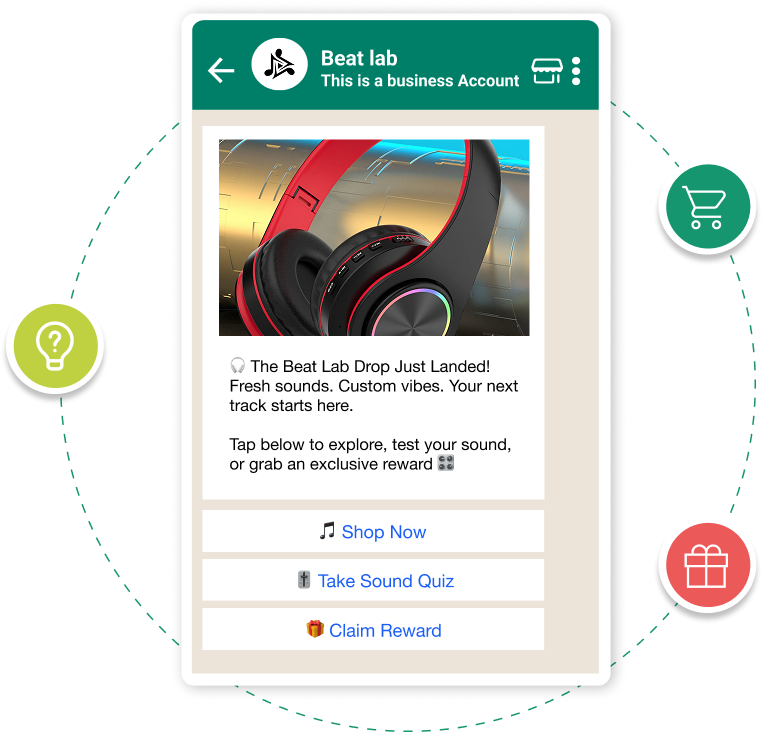
6. Automate Campaigns with Flows and Reminders
Automation helps you engage customers at the right moment without manually sending every message. You can set up sequences for follow-ups, reminders, or abandoned carts.
Why it matters:
Consistency drives engagement. Automation ensures no lead gets missed and your audience gets timely responses, even outside business hours.
How to do it:
Use Flowcart WhatsApp Flows to build dynamic options to navigate your WhastApp store. Create flows like “Welcome messages,” “Order confirmations,” or “Cart recovery.” Personalize each step to match customer behavior.

7. Test Campaigns (A/B Testing Messages and Timing)
Testing different versions of your campaign helps you identify what truly works, whether it's message tone or send time.
Why it matters:
Small tweaks can make a big difference. A slightly changed headline or timing might double your click-through rate.
How to do it:
Send two versions of the same campaign to different audience samples. Try variations in tone (“exclusive” vs. “limited-time”), format (text vs. image), or send times (morning vs. evening). Analyze which performs better before scaling up.
8. Track Results and Optimize (CTR, Conversion, Response Rate)
Tracking metrics is crucial to know whether your campaign met its goals. Measure engagement, conversions, and response rates to fine-tune future efforts.
Why it matters:
Without data, improvement is guesswork. Analytics show what’s working and what’s not, so you invest your efforts wisely.
How to do it:
Use WhatsApp Business API analytics or third-party tools to monitor message delivery, open rates, click-through rates (CTR), and conversions. Identify top-performing campaigns and replicate their strategy in future ones.
Types of WhatsApp Campaigns You Can Run
Businesses can use different campaigns to engage their customers and boost sales. Here are some of the most effective types:
Product Launches and Promotions
WhatsApp is perfect for announcing new products, special collections, or limited-time offers. Campaigns can include rich media like images, videos, and GIFs, along with interactive buttons that make it easy for customers to shop instantly.
By sending timely, personalized messages, brands can generate excitement and create urgency.
For instance, Nykaa, a fashion and cosmetic brand, frequently uses WhatsApp to inform loyal customers about new collection drops and exclusive discounts. This direct approach ensures that customers see the updates immediately, driving higher traffic to their online store and boosting early sales.

Cart Abandonment and Recovery
About 70% of online shopping carts get abandoned. WhatsApp provides a way to gently remind these customers and guide them back to checkout.
Messages can include the product image, a direct checkout link, and even small incentives such as discounts or free shipping to encourage conversion.
Amazon leverages this strategy effectively, sending reminders to users who leave items in their carts and often including time-sensitive offers. This approach helps recover lost sales while maintaining a personalized connection with the customer.
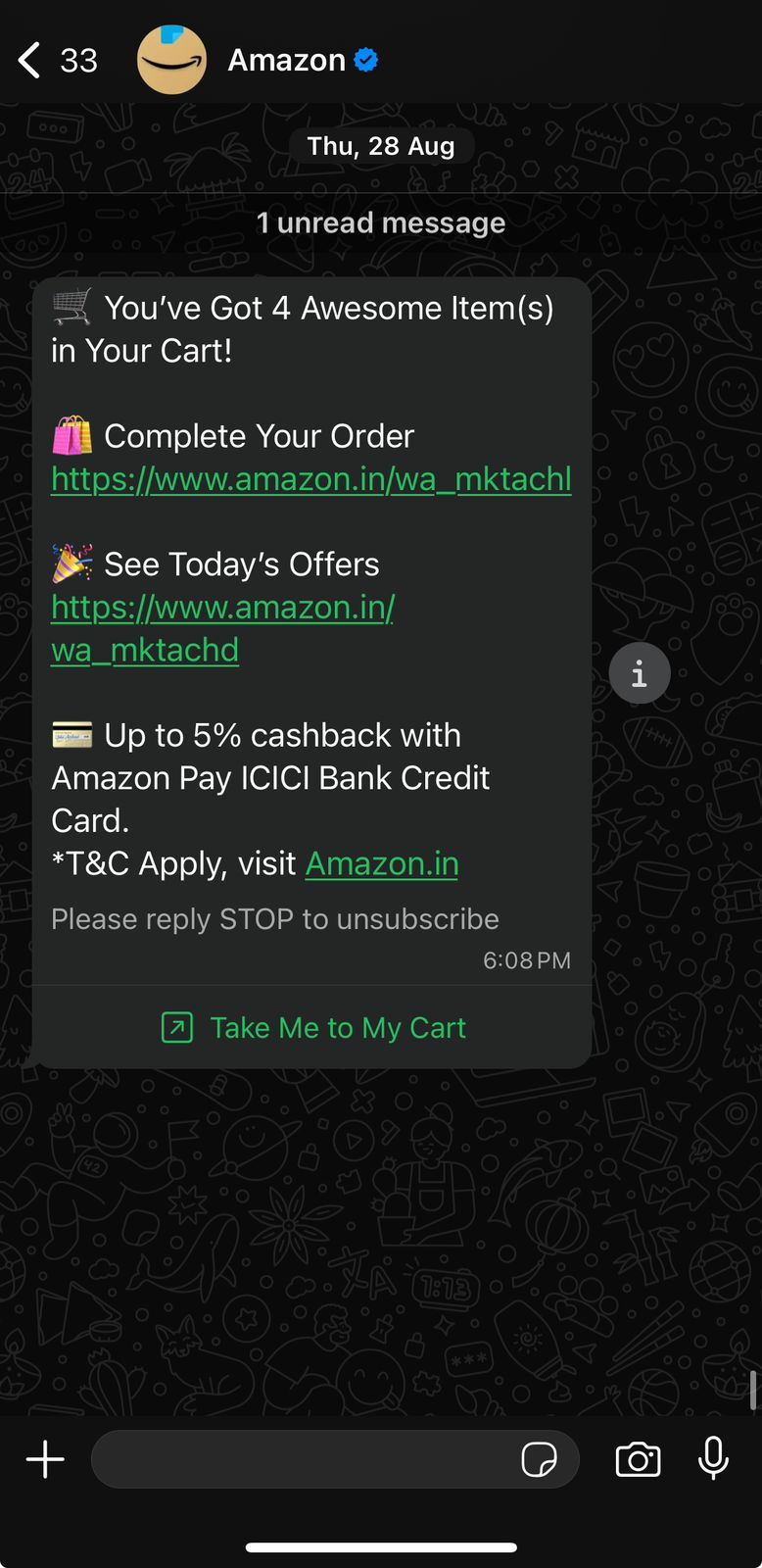
Event Reminders and Registrations
WhatsApp is an excellent tool for promoting events, webinars, workshops, or product demos. It allows businesses to send event details, registration links, and timely reminders directly to participants.
The real-time nature of WhatsApp ensures that attendees are well-informed and less likely to miss the event.
For example, Social, a restaurant chain in India, sends its customers a link to book its event and send an RSVP right away with just a click. This message does not only just put out the word but also lets interested candidates reserve their seats right away.
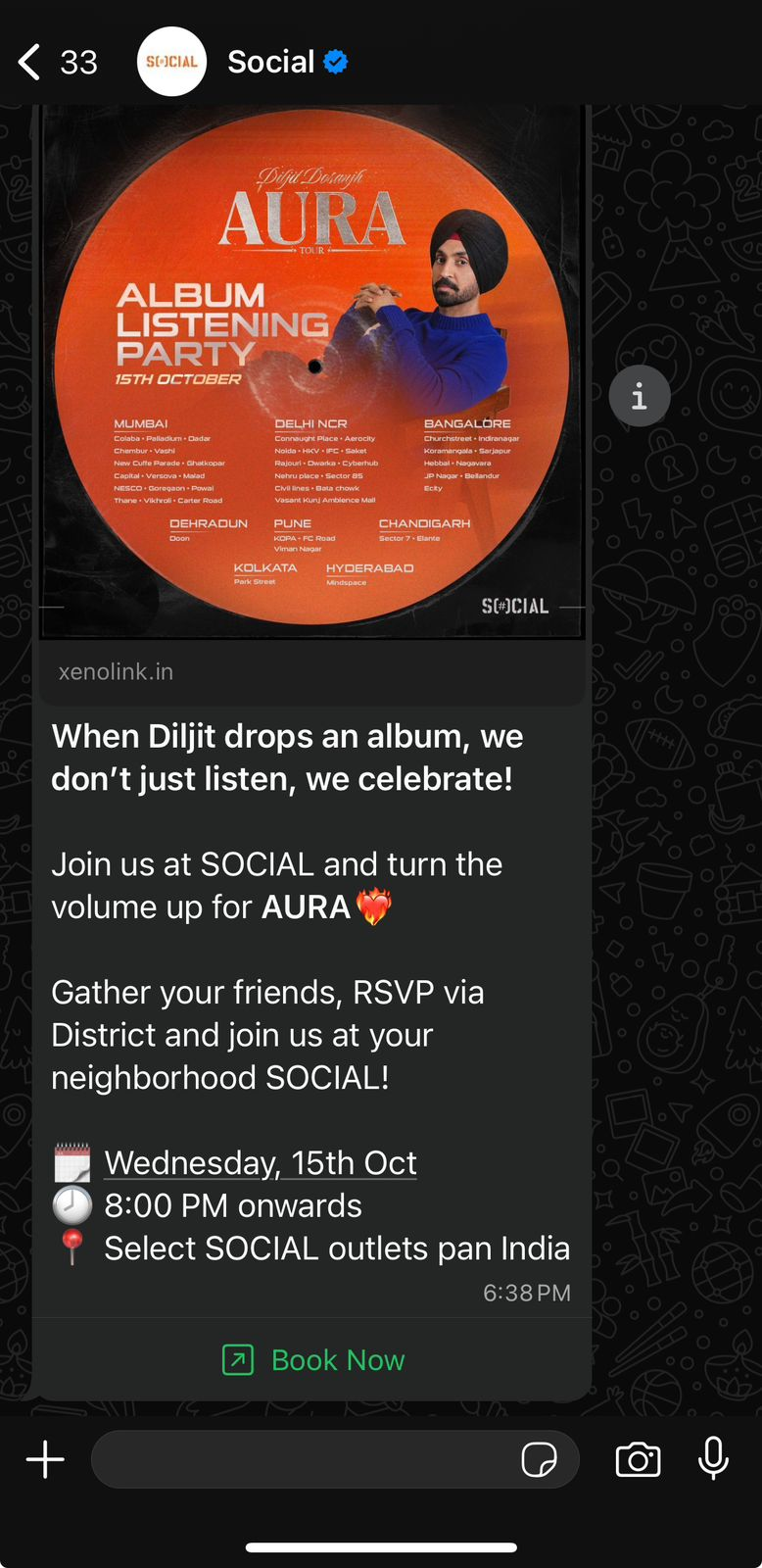
Loyalty and Referral Campaigns
WhatsApp can help businesses reward repeat customers and encourage referrals in a seamless, personal way. Messages can highlight loyalty points, special discounts, or referral rewards, motivating customers to take action.
Zepto, an instant grocery partner, often uses WhatsApp for loyalty campaigns, alerting customers about earned points, exclusive offers, and limited-time referral promotions. By making rewards and referral opportunities easily accessible within a chat, customers are more likely to participate.
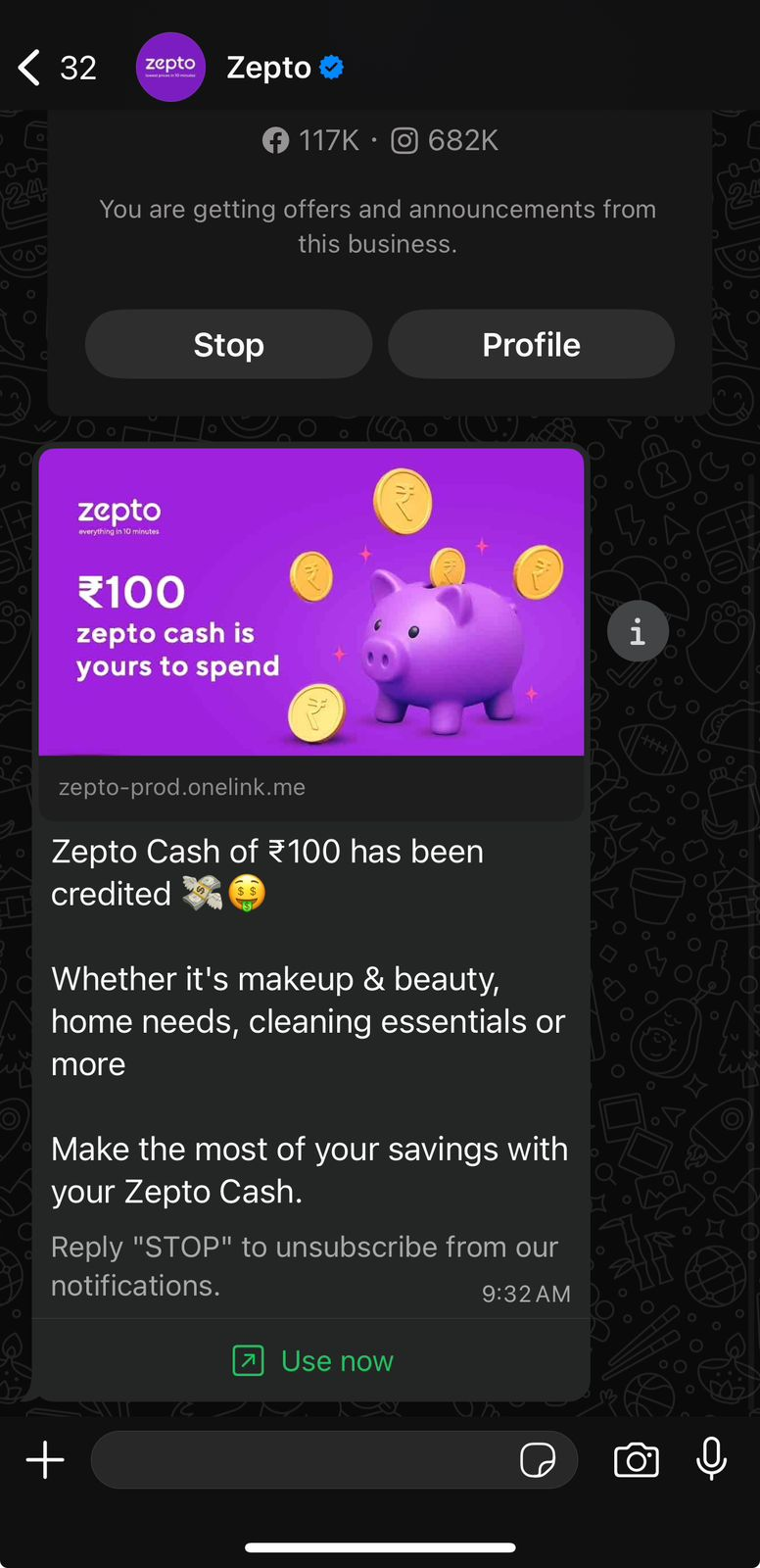
Customer Surveys and Feedback
Collecting customer feedback is essential for improving products and services, and WhatsApp makes it convenient. Short, conversational messages with quick reply options or rating buttons encourage users to share their opinions without effort.
With Flowcart, you can take it a step further by rewarding customers for completing surveys, turning feedback into a more engaging and motivating experience.
Toronto, a jewelry brand, uses this approach by sending follow-up messages post-delivery, asking for reviews. This not only helps the brand gather valuable insights but also demonstrates that they value customer input, strengthening trust and loyalty.

Best Practices for WhatsApp Marketing Campaigns
Running a successful WhatsApp marketing campaign is about creating meaningful, engaging interactions with your customers. To make sure you make the most of WhatsApp marketing, here are some practical tips:
Always Get an Explicit Opt-In
Ensure customers have clearly agreed to receive messages. Explicit consent not only keeps you compliant with WhatsApp rules but also builds trust. Customers who opt in are genuinely interested, which increases engagement and response rates.
Balance Automation with Human Interaction
Automation helps scale messaging and maintain consistency, but it shouldn’t replace personal engagement. Chatbots can handle routine queries or reminders, while human agents step in for complex questions or personalized support. This balance ensures customers feel valued and heard.
Personalize Beyond Just the First Name
Go beyond using a customer’s name. Tailor messages based on purchase history, interests, or location to make communication feel relevant. For example, alerting a customer about a product related to their previous purchase or a local offer adds value.
Don’t Over-Message
Even with high engagement, too many messages can annoy customers. Limit promotional messages and space them based on content type and customer preference. Transactional updates can be sent as needed, while offers and promotions should be strategic and timely.
Use Analytics to Continuously Optimize
Track open rates, clicks, responses, and conversions to understand what works. Use this data to refine messaging, timing, and targeting. Continuous optimization helps you improve ROI and engagement over time.
Offer Easy Opt-Out or Pause Options
Respect your customers’ preferences by giving them the flexibility to opt out or pause messages anytime. This transparency not only keeps your brand compliant but also builds trust, showing customers that you value their choice and comfort.
Also Read: 14 Benefits of WhatsApp Business Every Company Should Leverage
How Flowcart Simplifies Running WhatsApp Campaigns
We know what you are thinking. WhatsApp campaign sounds great but how do you manage all this, right?
That’s where Flowcart comes in to do your work for you. It is an AI-powered conversational commerce and CRM platform built on WhatsApp that streamlines the entire customer journey from acquisition to checkout to redemption.
Key Features
Flowcart has a suite of intelligent features. Here's how each of them enhances your campaign effectiveness:
- End-to-End Campaign Automation: Automate the entire customer journey from lead capture to post-purchase follow-ups. Flowcart's pre-built automation blueprints simplify campaign setup, ensuring timely and personalized interactions. This reduces manual effort and enhances customer engagement.
- Smart Broadcasts: Deliver tailored WhatsApp campaigns to segmented audiences based on behavior, preferences, or purchase history. Flowcart's smart broadcasting ensures your messages reach the right customers at the optimal time, boosting interaction and conversion rates.
- Real-Time Analytics: Access comprehensive insights into campaign performance, including open rates, click-through rates, and conversions. Flowcart's real-time analytics dashboard enables data-driven decision-making, allowing you to optimize campaigns for better results.
- Loyalty Program: Reward repeat customers with points, exclusive offers, and in-chat redemption options. Flowcart's loyalty program fosters customer retention and encourages repeat purchases, enhancing lifetime value.
- In-Chat Checkout: Enable customers to complete purchases directly via multiple global payment gateways within WhatsApp conversations. Flowcart's in-chat checkout feature streamlines the buying process, reducing friction and cart abandonment, leading to higher conversion rates.
By leveraging these features, Flowcart simplifies the complexities of WhatsApp marketing, enabling businesses to deliver personalized, efficient, and scalable campaigns.
Pricing
Flowcart has customized pricing plans catering to all businesses, whether you are a growing business exploring conversational marketing or a large enterprise. Here are its four Flowcart pricing options:
- Starter: $69.99/month
- Growth: $129.99/month
- Pro: $199.99/month
- Enterprise: Custom
Ready to kickstart your WhatsApp conversational marketing journey? Start a free trial now!
Customer Testimonial
Flowcart has been the trusted choice of 300+ e-commerce brands and the results speak for themselves. Uncover Skincare, a beauty brand, transformed its marketing and sales using Flowcart’s WhatsApp platform.
By leveraging targeted broadcasts, interactive product quizzes, and in-chat checkout, the brand delivered personalized experiences that guided customers from discovery to purchase seamlessly.
WhatsApp campaigns now generate 3× more revenue than email, with engagement rates and conversions significantly higher. The brand also plans to expand WhatsApp commerce into new markets like Nigeria and South Africa, showcasing how Flowcart’s tools can scale customer interactions while driving measurable business growth.

Read more on how other brands used Flowcart to boost sales using WhatsApp marketing campaigns.
Conclusion
In 2026, WhatsApp campaigns are essential for brands that want to stay connected with their customers. With billions of users relying on WhatsApp for daily communication, it has become the go-to channel for conversations that convert.
By combining the right strategy with Flowcart’s powerful automation, analytics, and personalization tools, businesses can run WhatsApp campaigns that truly engage, nurture trust, and drive measurable sales. Whether it’s launching new products, recovering carts, or rewarding loyal customers, Flowcart helps you do it all faster, smarter, and at scale.
Frequently Asked Questions (FAQs)
How many messages per day are safe to send in a WhatsApp campaign?
Sending 1–2 messages per day or a few per week is ideal. Over-messaging can annoy customers and lead to opt-outs, so focus on quality and relevance.
Can small businesses run campaigns without expensive tools?
Absolutely. Tools like Flowcart make WhatsApp marketing affordable and easy to automate, even for small businesses. You can start with basic broadcasts and scale as you grow.
What’s the ROI of WhatsApp campaigns vs email?
WhatsApp delivers a much higher ROI due to its high open rate and real-time engagement. Many businesses see 2–3× higher conversion rates than with email.
How do I measure campaign success on WhatsApp?
Track open rates, click-through rates (CTR), conversions, and response time. WhatsApp campaign management built-in analytics makes it easy to monitor all these metrics in real time.
What industries benefit the most from WhatsApp campaigns?
E-commerce, retail, beauty, and service-based industries gain the most, but any business that thrives on direct customer interaction can see strong results from WhatsApp marketing.
Marketing used to be about telling your story.
Now, it’s about starting a conversation.
In 2026, WhatsApp has become the front door to your brand. Customers rarely wait for your newsletters instead, they message your business directly.
The future belongs to marketers who can design conversational experiences: WhatsApp flows that guide, engage, and sell naturally. You must understand that the difference between a “message” and a “chat” is the difference between a scroll and a sale.
That’s exactly what we’re building with Flowcart. We aim to make every brand sound human at scale.
I’ve broken down how to run WhatsApp campaigns that feel like conversations, not commercials.
.png)


.png)


%201.webp)

